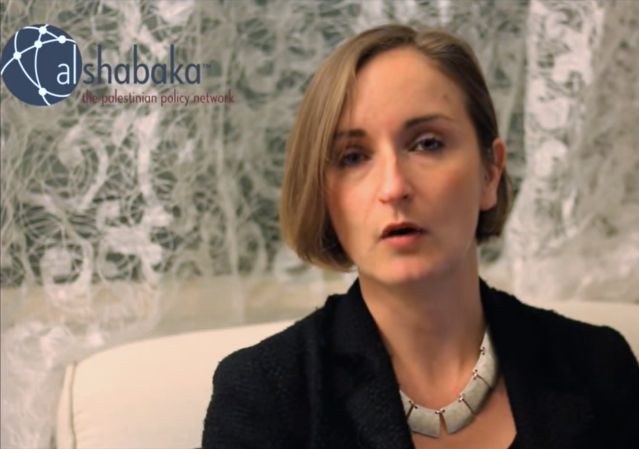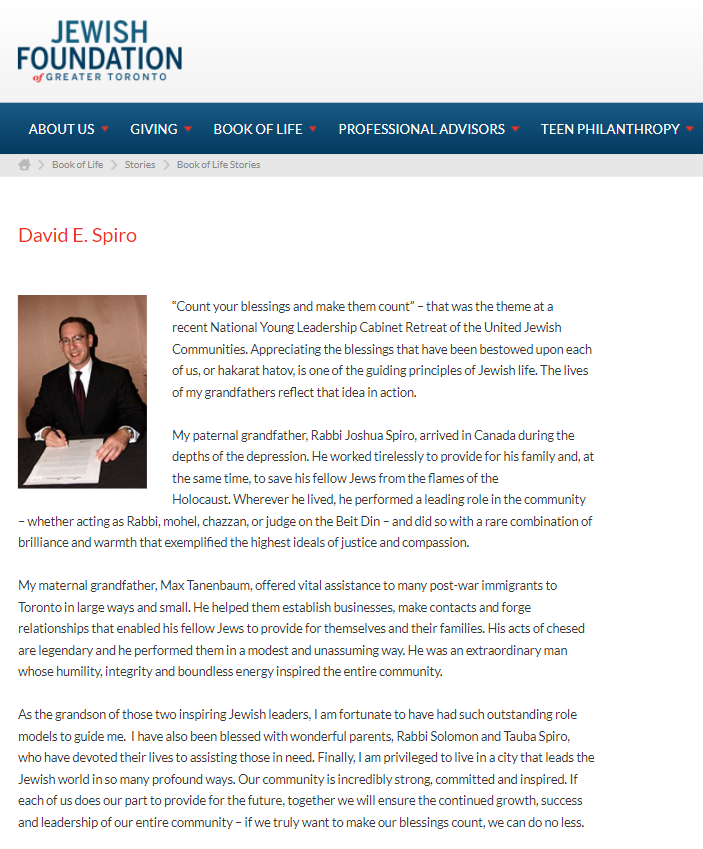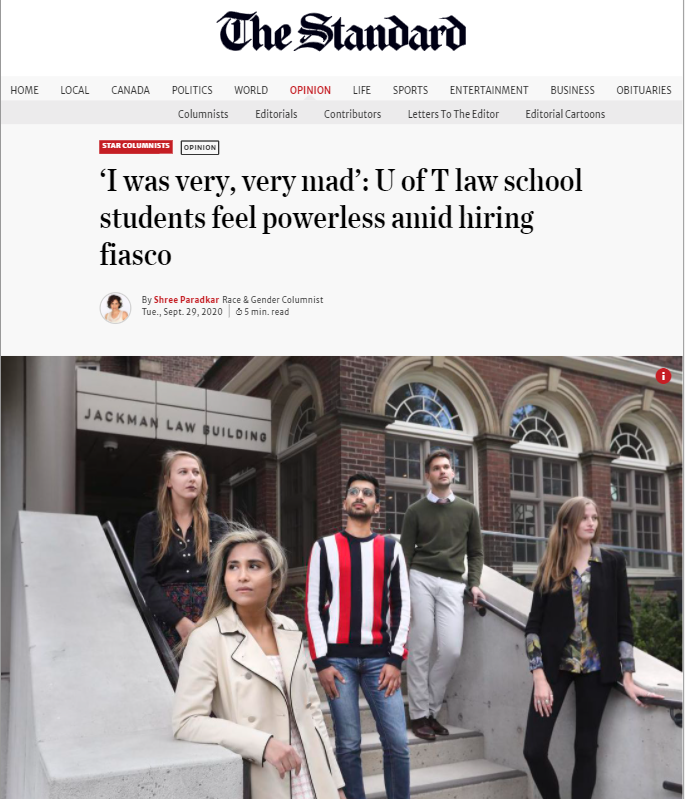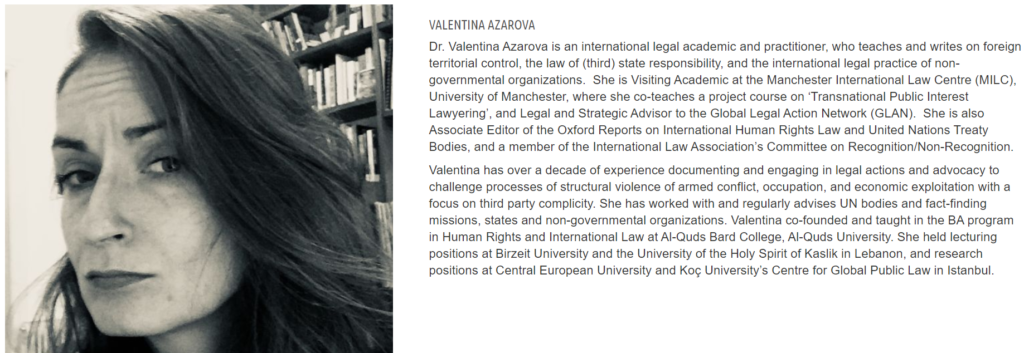Claims That U. Toronto Succumbed To Zionists In Denying Human Rights Position To Valentina Azarova Fall Flat
More likely, the requirements to lead the prestigious International Human Rights Program were inconsistent with politicized scholarship, a problem we see time and again where academics become activists.

When asserted “human rights scholar” (and anti-Israel polemicist) Valentina Azarova was denied a position leading the prestigious International Human Rights Program (IHRP) at the University of Toronto, media and anti-Zionists alike painted a picture of Zionist Cancel Culture at work.
[toc]
A Case of Zionist Cancel Culture?
The intial narrative that emerged in this case is one in which a Jewish Tax Court judge, reportedly furious about Valentina Azarova’s critiques of “Israeli human rights abuses” against Palestinians, may have used his status as a “major donor” to pressure the university to rescind its job offer.
Shree Paradkar, The Toronto Star‘s “race and gender columnist” first broke the story in mid-September. Since then, she has covered the controversy extensively; she’s written at least eight articles about it since September 17th.
But, as is usual in cases of controversy over academic anti-Israel demagoguery (see our write-up of BDS-activist-turned-professor Ilana Feldman‘s appointment as interim dean of the Eliot School at George Washington University), there may be more to the story than The Star’s Paradkar (among others) would have you believe.
Alleged Donor Judgment
According to The Toronto Star, the controversy began during the University of Toronto’s summer search for a new International Human Rights Program (IHRP) director. During the hiring process, a Tax Court judge, reportedly also a “major donor” to the university, apparently complained privately to a member of the university’s law school fundraising team about Azarova’s candidacy. (How the judge would have heard about her application in the first place remains unclear.)
The first public reports of this judge’s alleged interference in the hiring process came from a September 12 letter to the university’s law school dean, Edward Iacobucci, from two former directors of the IHRP program—Carmen Cheung and new official with Human Rights Watch (HRW), Samer Muscati. Their letter claimed that “Faculty was contacted by a judge…[and] shortly thereafter, Dr. Azarova’s offer was rescinded by the Faculty.” The letter also stated that Audrey Macklin, chair of the law school’s faculty advisory and selection committees, had resigned from these posts in protest.
Shree Paradkar did not reproduce or link the letter in her initial Toronto Star piece on the controversy, but we’ve included it below.
Letter to Dean Iacobucci From Former IHRP Directors Sep 12 by Samantha Mandeles on Scribd
Ten days after Cheung and Muscati wrote to Iacobucci, Paradkhar published reports that “two sources have independently named the…judge to the Star” as David E. Spiro, a Jewish alumnus of the UT Law School and a listed donor to the Faculty of Law Building Campaign and the Campaign for Excellence Without Barriers (he is listed in the $25k-$99k donation category). The Globe and Mail also picked up the story:
Before the Liberal government appointed him to the Tax Court last year, he advised the law school on its $30-million fundraising campaign. His extended family has donated tens of millions of dollars to the University of Toronto and its affiliated hospitals.

Meanwhile, university officials have maintained that the hiring process was not influenced by outside pressure of any kind, and that it was indeed confidential:
“The hiring process for the IHRP director, which is a managerial staff position — not a faculty one — was confidential, and the university is continuing to do its best to maintain confidentiality, notwithstanding insinuations and the selective disclosure of information, including emails, that have been published out of context,” said Kelly Hannah-Moffat, vice-resident of human resources and equity.
The university has not publicy confirmed (nor has it denied) that any judge expressed dismay over Azarova or attempted to leverage his financial contributions to the school.
The Offer That Wasn’t
Moreover, the university insists that it never actually extended a formal offer of employment to Azarova.
The university said while “exploratory discussions occurred with one candidate,” it backed the assertion by Iacobucci in his email that, “No offer of employment was made because of legal constraints on cross-border hiring that meant that a candidate could not meet the Faculty’s timing needs.”
Kelly Hannah-Moffat, vice-resident of human resources and equity, reportedly stated,
We can confirm that no offer of employment was made to any candidate, and therefore, no offer was revoked. The Faculty of Law has cancelled the search. No offers were made because of technical and legal constraints pertaining to cross-border hiring at this time.
But The Toronto Star published excerpts of internal emails it says contradict the school’s claim:
Vincent Wong, who was on [the three-member hiring] committee, shared the emails with the Star.
One email from assistant dean Alexis Archbold on Aug. 21 to Audrey Macklin and Wong says in part: “Spoke to the UT employment lawyers today and they confirmed that we can hire Valentina as an independent contractor and roll her into the permanent position when she has her permit in hand. Valentina is happy with this.”
As for the faculty’s timing needs, another email from Archbold to Macklin and Wong on Aug. 20 says, “In a nutshell, we are hoping to work out a way for Valentina to start work for us before she has a Cdn work permit in hand … Valentina is willing to start working remotely immediately. She plans to move to Canada by December.”
Azarova, The Globe and Mail reported in mid-October, has maintained that “she was offered the position on Aug. 11 and accepted the offer on Aug. 19, only to see the offer rescinded in early September.” Azarova claims that the formal offer was made over a Zoom call. It is also unclear why selection committee members would still be attempting to arrange the terms of Azarova’s employment on August 20th if a formal offer of employment had been made and accepted.
Public Outrage
As the media reports over the controversy continued, NGOs around Canada began to issue public comment. Some demanded investigations, or complained about the “inappropriate” pressure. Others lamented the threat to academic freedom and “anti-Palestinian racism”. The Canadian Association of University Teachers weighed in, as did Amnesty International, the British Columbia Civil Liberties Association, the Arab Canadian Lawyers Association, Lawyers’ Rights Watch Canada, Human Rights Watch Canada‘s director Farida Deif, and law professors from other universities. [The CAUT’s September 21 statement. Read the rest here.]
BCCLA, @CanArabLaw, @IndJewishVoices filed a complaint to the Canadian Judicial Council regarding the alleged conduct of Justice David Spiro in the UofT hiring of Dr. Azarova, citing anti-Palestinian racism.
Read our joint complaint and release here: https://t.co/0I6u4M7k79
— BC Civil Liberties Association (@bccla) October 27, 2020
Shree Paradkar also published an op-ed in The Standard describing students’ “rage” at the episode and their concern that it demonstrates the school “undervalues opinions of students…who don’t go into lucrative professions”.

Counter-Narrative: Incestuous Anti-Israel Involvement
If it seems peculiar that massive “human rights” organizations would weigh in on such a controversy, perhaps an explanation of Azarova’s personal connections with the group—and the IHRP itself—can shed some light on the situation. In fact, Azarova is married to Bill Van Esveld—a long-time Middle East-focused official at Human Rights Watch with a history of endorsing false claims and biased reports from a wide variety of anti-Israel sources.
Van Esveld is presumably connected to the last head of the IHRP program—Samer Muscati—who now works at Human Rights Watch as well, and co-wrote the original September 12 letter to Iocabucci.
Controversies at @UTLaw, @yorkuniversity highlight escalating suppression of moderate voices criticizing Israel, writes @TorontoStar’s @ShreeParadkar https://t.co/SCeHqdNdvF
— Samer Muscati (@SamerMuscati) October 25, 2020
Such a powerful piece by @UofT professor Judith Taylor in @TorontoStar today.
Lobbying universities over their hiring decisions is shameful and unethical.https://t.co/SVEMxoxLo4 @UTLaw @IHRP_UofT
— Samer Muscati (@SamerMuscati) October 16, 2020
Human Rights Watch Canada director Farida Deif, who wrote and posted the impassioned defense of Azarova on the HRW website, is also a close colleague of Van Elsveld, and even acknowledged as much in her article.
Finally, it probably did not hurt Azarova’s chances that now-resigned hiring committee chair Audrey Macklin has a long history of anti-Israel activism and connections to the Boycott, Divestment, Sanctions campaign against the Jewish state.
Anti-Israel “Scholarship”

The debate over outside influence notwithstanding, Azarova’s “scholarship” has been criticized as sloppy, biased, and “obsessively committed” to demonizing Israel.
Azarova’s academic record shows a focus on substantiating hyperbolic accusations against Israel; accordingly, she has whitewashed Israel’s adversaries. In the video below, she bizarrely states that “legally, McDonald’s and Hezbollah are the same.”
Throughout her career, Azarova has been involved with pro-BDS NGOs, including Al-Haq (which has long been linked to the Marxist terror group Popular Front for the Liberation of Palestine ) and Al Shabaka. She has also been quoted in virulently anti-Israel publications such as Electronic Intifada and Al-Majdal Quarterly, and supports a “one-state solution”.
Furthermore, Azarova herself has attempted to ‘cancel’ academics with whom she disagrees.
Azarov sought to have me boycotted when I was chosen to speak at an academic conference, presenting a paper she disagreed with. I did speak, she publicly protested my right to do so. A head of an academic unit can't suppress academic views they disagree with. https://t.co/Gq17ckhCKi
— Eugene Kontorovich (@EVKontorovich) September 17, 2020
Conclusion – The Zionist ‘Cancel Culture’ Narrative Fails
Despite widespread attempts to paint Azarova as an unbiased scholar (and a victim of a Zionist cover-up), the story is not that simple. Whether it initially came from a sitting judge and donor or not, concern over Azarova’s candidacy for this position is valid. Indeed, her anti-Israel activism and her “scholarship” are merged. As we’ve written before,
This is not uncommon among BDS supporters. Their academic reason to be is to advocate one-sided, ahistorical narratives about Israel in which there is one pure perpetrator, and one pure victim.
It would likely be difficult for Azarova to abide by an honest commitment to academic freedom and universal human rights; would students and faculty who disagree with Azarova’s vendetta be permitted to publish or argue in opposition to it? To even express themselves at all?
Appointing Azarova to direct UT’s IHRP in an un-biased way would be asking her to deny who she is, to be a fake in the position. To expect Azarova to behave toward Israeli or Zionist IHRP colleagues and students with the same professionalism she’d be expected to employ in all other interactions would be to expect her “to admit her life work was a fraud, that she didn’t really mean all the things she said about the inherent evil of Israel and Israelis.”
As in the Ilana Feldman case, there’s a lesson UT and “other universities need to take away from this episode. You can have academic freedom, or you can have a pro-BDS Dean, but you can’t have both.”
Samantha Mandeles is Senior Researcher and Outreach Director at the Legal Insurrection Foundation.
Donations tax deductible
to the full extent allowed by law.








Comments
Suppose it were true that they were going to hire her and decided not to because a major donor urged them against it. Why would that be wrong? Isn’t he entitled to have his opinion considered and given weight? Don’t his donations entitle him to that? Why should anyone give money if they are to be ignored when something they care about is happening?
Because government should control everything and gen Z woke mobs have more wisdom than experienced and accomplished people of past genaerations. Welcome to the twilight zone.
This is Canada, and things get very murky when it comes to academia, hiring and motivations. Basically, there’s no real distinction between “public” and “private” universities (I think there’s a small number of truly independent private colleges, but not many), Canada’s Human Rights Code forbids discrimination on a wide and ever-expanding variety of grounds, and the current federal government is basically what the Squad dreams of being some day.
So while it ought not to matter, this is a country where Muslim students besieged Concordia University for daring to host Netanyahu at a speaking engagement without any real repercussions and the last time I was on U of T’s Mississauga Campus it was two hours before I saw another white person. Like it or not, the MSA runs the universities in Toronto at the academic level.
If the university students feel “powerless” when something they’re not directly involved with doesn’t go their way, they’ll be reduced to a quivering, panicked mess when they get a real job. Assuming they get a *real* job.
Welcome to the world, Thweeties.
.
I stopped reading the Toronto Star after their biased anti-Israel coverage of the Six Day War but I’m not surprised they’d have a “Race and Gender columnist”. Sounds like something from a Monty Python sketch.